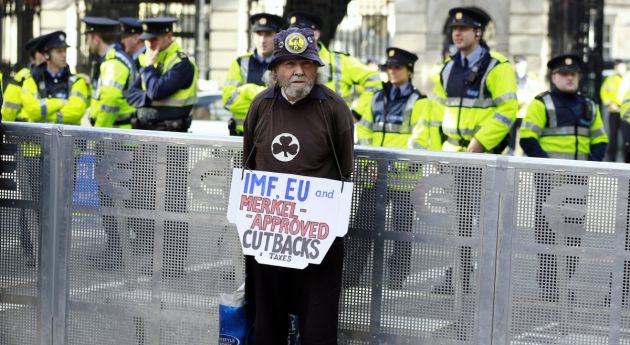France, Germany push for "Robin Hood" tax, seen falling short of early goal

BRUSSELS, May 6 (Reuters) - France and Germany led a group of countries on Tuesday in pushing for a tax on financial trading although the levy is set to fall far short of what was pledged at the height of the financial crisis and may be pared back further.
Promised in 2011 by German Chancellor Angela Merkel and the then French president, Nicolas Sarkozy, as a means of getting banks to pay for a financial crisis that had then bankrupted Greece and Ireland, the tax was contested from the outset.
Finance ministers from a group of 11 euro zone countries that back the tax made a further pledge on Tuesday to introduce it by January 2016 at the latest. Crucial questions such as how high the tax should be and how it will be charged remain open.
"I believe we will reach a political agreement on a financial transactions tax, all ministers are ready," Luis de Guindos, Spain's economy minister, told reporters ahead of a gathering of EU ministers. "I hope we will reach agreement on the assets to be included, mainly shares and some derivatives," he said, sharing a view supported in particular by Italy.
"We want the rules agreement this year so it can come into force next year," he said. "We still need to decide the level of the tax and how it will be levied."
Resurrecting an idea first conceived by U.S. economist James Tobin more than 40 years ago is symbolically important in showing that politicians, many of whom have been accused of fumbled their way through the crisis, were tackling the banks blamed for causing it.
As ministers met in Brussels, activists in favour of a 'Robin Hood tax' - after the British "outlaw" who was said to rob the rich to give to the poor - acted out a boxing match to symbolise the fight over the levy.
In one corner, an activist dressed in green and wearing a quiver of arrows pretended to knock out his opponent who was dressed as a banker in a suit.
"This is a fight between bankers and Robin Hood," said Natalia Alonso, a campaigner at Oxfam. "We are saying that the money raised with this tax should go to fighting poverty."
Reaffirming a commitment to the tax is also important ahead of European elections that are expected to see a rise in support for populist eurosceptic parties. Many experts, however, expect the scheme to be quietly shelved afterwards because it is difficult to implement.
"TAX ON JOBS, PENSIONS"
Ignoring warnings from the European Central Bank that the levy would backfire, Merkel and Sarkozy had initially sought to win support across the European Union before scaling back plans, in the face of stiff opposition, to just the euro zone.
Ultimately they had to make do with an shaky alliance of 11 countries, some of whom diplomats said reluctantly signed up to keep Germany happy. Divisions remain within the group over how the tax should work, including between Paris and Berlin.
Anders Borg, the Swedish finance minister and long-term critic of the project, reiterated his opposition to what he called a "very inefficient and costly tax".
"The lack of information on the (11 countries') proposal is a real problem," he said.
Britain's finance minister George Osborne told ministers said it was "a tax on jobs ... a tax on people's pensions", in remarks broadcast to reporters.
Moreover, it has been clear from early last year that the final plan will be scaled back, initially imposing a tiny charge on share deals only and taking much longer than originally intended to achieve a full roll-out.
Officials have told Reuters that the redesigned levy would raise only about one tenth of what was once targeted. Officials in Brussels had expected the financial transactions tax (FTT) to raise up to 35 billion euros ($49 billion) a year.
Under a re-drafted model, the standard rate for trading bonds and shares could drop to just 0.01 percent of the value of a deal, from 0.1 percent in the original blueprint.
That would cut income to roughly 3.5 billion euros, or perhaps even less, said one senior EU official. The tax may now also be introduced more gradually. ($1 = 0.7205 Euros)